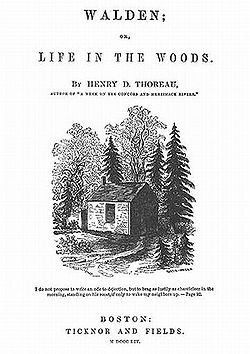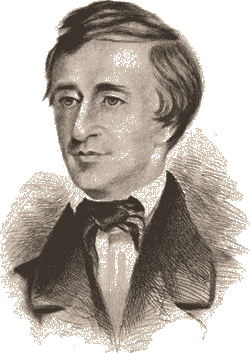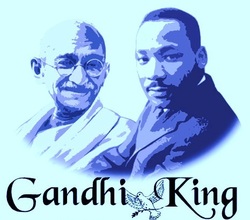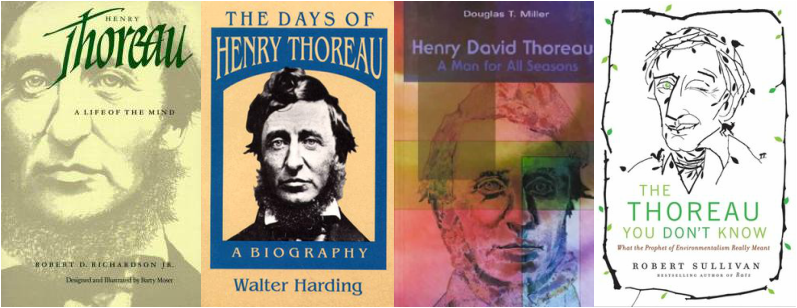|
Henry David Thoreau, born this day in 1817, was a Renaissance man who just happened to live in 19th century America. He was a poet and philosopher who worked for a time as a down-to-earth surveyor and pencil-maker, a naturalist who reveled in the wild but was absolutely not a cranky hermit, and a tax-resister who wrote the book, literally, on civil disobediance.  "A truly good book teaches me better than to read it. I must soon lay it down, and commence living on its hint. What I began by reading, I must finish by acting." Thoreau didn't go to Walden Pond just to commune with Nature. He was looking for a quiet place to do some writing and his friend Ralph Waldo Emerson had this nice rustic place on the water. It was perfect for getting a little solitude and being able to tune-out all the hassles of modern life! I can't imagine what he would think about our wired 24-7-365 lifestyle. He might be one of those people running down the street buck-naked, his crazed rants captured on someone's iPhone and posted to YouTube as it happens. As he noted in a chapter of Walden: "I went to the woods because I wished to live deliberately, to front only the essential facts of life, and see if I could not learn what it had to teach, and not, when I came to die, discover that I had not lived." He wasn't a Material Guy and frankly, wasn't pulling in a lot of benjamins at the time so he figured he could reduce his material needs by living simply, rather than support a lifestyle back in Concord that he didn't need or really care about. And if he could do a little communing and meditation, well, so much the better.  Portrait of Thoreau by Samuel Rowse (1854) In his famous lecture, "Life without Principle" given first in 1854 at Railroad Hall in Providence, Rhode Island and several more times over the course of the next year, Thoreau argued that work should be something we love in order to lead a life worth living, not simply to make a living. Well, that's all very well and good for a Harvard man to spout such idealistic notions, but he seems to have completely forgotten about the poverty-striken masses who were (and still are) struggling to pay the rent and put food on the table for their children. The ideal fulfilled life may indeed be found in pursuing a path that leads us to what we truly love to do, and then work doing that; however, the reality is that many people lack that freedom and must take a job because it comes with a paycheck. But I'm willing to forgive him because he did write a lot of great quotes about books! "Books are the carriers of civilization. Without books, history is silent, literature dumb, science crippled, thought and speculation at a standstill. I think that there is nothing, not even crime, more opposed to poetry, to philosophy, ay, to life itself than this incessant business."  Mohandas Gandhi, Martin Luther King, Jr., Leo Tolstoy, Martin Buber and Supreme Court Justice William O. Douglas all have this in common: an admiration for Thoreau's essay of 1849 "Civil Disobedience," originally published as "Resistence to Civil Government." (It not clear whether he actually ever uttered the words "civil disobedience.")But beyond the big names, the essay was read in the 1940's by the Danish resistance; in the 1950's, it was brandished by those who opposed McCarthyism; in the 1960's, it was influential in the early struggle against South African apartheid; and in the 1970's it was discovered by a new generation of anti-war activists. The essay contains the famous quote often misattributed to Thomas Jefferson: "I heartily accept the motto, — ‘That government is best which governs least.'" Thoreau was actually was referring to an existing saying that was the motto for the journal The United States Magazine and Democratic Review, which was edited by American journalist and editor John Louis O’Sullivan. In 1844, Thoreau’s old pal Emerson also wrote in an essay: “The less government we have, the better.” (What's a little borrowing among friends?) Hmm, I foresee Thoreau's face soon will be glaring out at me from posters held aloft by Tea-Party protesters. Here's what his man-crush Emerson had to say about him: "He was bred to no profession; he never married; he lived alone; he never went to church; he never voted; he refused to pay a tax to the State: he ate no flesh, he drank no wine, he never knew the use of tobacco; and, though a naturalist, he used neither trap nor gun. He chose, wisely, no doubt, for himself, to be the bachelor of thought and Nature. He had no talent for wealth, and knew how to be poor without the least hint of squalor or inelegance. .... Thoreau was sincerity itself ..." You can read more about this fascinating fellow with these biographies, which range from the scholarly to the refreshingly whimsical:
Henry Thoreau: A Life of the Mind - Robert Richardson, Jr. (1988) Henry Thoreau: A Biography - Walter Harding (2011) Henry Thoreau: A Man for All Seasons - Douglas T. Miller (2001) The Thoreau You Don't Know - Robert Sullivan (2009)
0 Comments
|
AuthorTo find out more about me, click on the Not Your Average Jo tab. Archives
February 2024
Categories
All
|

 RSS Feed
RSS Feed